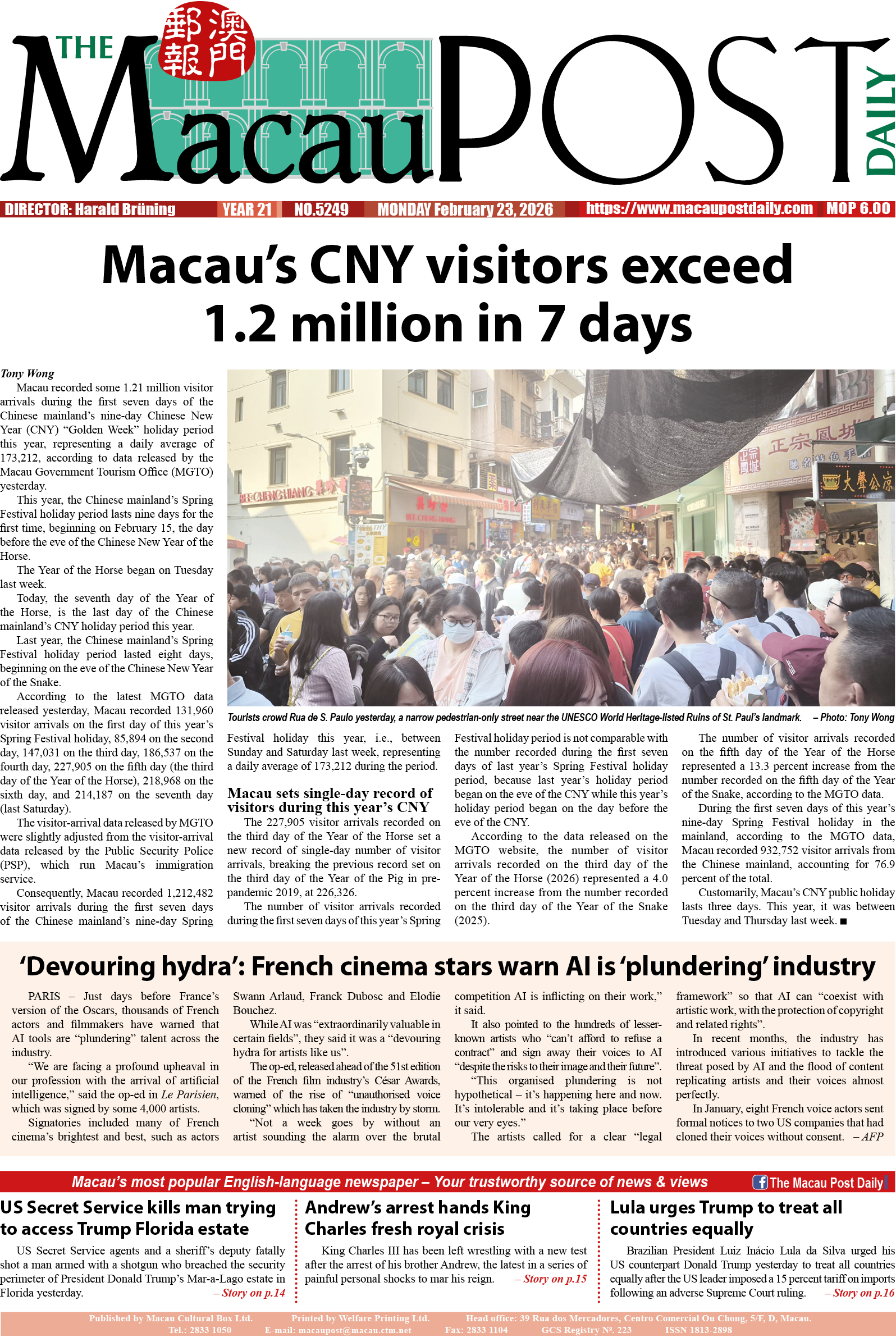Editorial
US Treasury Secretary Janet Yellen’s four-day official visit to Beijing started on Thursday with a symbolically important rainbow over the airport and ended yesterday with a press conference at the US embassy during which she said that her high-level talks had helped put ties between the two economic giants on “surer footing”.
Off course, that’s good news but – as any realist knows – the proof is in the pudding.*
Let’s see how the Biden administration will translate Yellen’s reassuring remarks into concrete action. Follow-up action is the ultimate determiner of political success.
In front of the cameras, Premier Li Qiang told Yellen at the start of their meeting at the Great Hall of the People on Friday that “… the moment you arrived at our airport and left the plane, we saw a rainbow.” And Li added, most significantly, “I think it can apply to the US-China relationship too: after experiencing a round of winds and rains, we surely can see a rainbow.”
In traditional Chinese culture, the rainbow has taken on different meanings, depending on the historical period, but nowadays the meteorological phenomenon is generally seen as an auspicious omen symbolising a new beginning, prosperity and happiness.
Xinhua quoted Li as saying during the meeting that “Chinese culture values peace above everything else, as opposed to hegemony and bullying”. That’s what one calls a broad hint.
The premier emphasised that the economic interests of China and the United States are closely intertwined, and he underlined that mutual benefits are the essence of China-US economic relations. “China’s development is an opportunity rather than a challenge for the United States, and a gain rather than a risk,” Li said, adding that that politicising economic cooperation or overstretching the concept of national security on such cooperation does no good for the economic development of the two countries and the whole world.
Li, who studied agricultural mechanisation, sociology, management engineering and world economics at various tertiary education institutions in the mainland and holds an executive master’s degree in Business Administration from Hong Kong Polytechnic University, called on both sides to strengthen communication and seek consensus on important bilateral economic issues through candid, in-depth and pragmatic exchanges. Li is a former Party secretary of Shanghai and ex-governor of Zhejiang
Yellen, an economics professor and former Fed chair, told Li that the US does not seek to decouple or sever supply chains, and has no intention of hindering China’s modernisation process.
Both Li, 64, and Yellen, 76, are certainly equipped with the right professional and academic baggage required for their respective portfolios. I would like to see top political office-bearers in certain European countries holding similarly impressive curricula.
In a meeting hosted by the American Chamber of Commerce (AmCham) with US business representatives in Beijing during her visit, Yellen stressed that “a decoupling of the world’s two largest economies would be destabilising for the global economy… and it would be virtually impossible to undertake.”
Of course, it would. On the one hand, Yellen’s remarks may be seen as mere truisms or even bromides but, on the other hand, I think, they are important as they have been made by none other than her.
I must admit that I do have a soft spot for Yellen because I share her Keynesian views on economics and her conviction that governments have a duty to tackle poverty and inequality. Poverty alleviation is something that many other Western politicians seem to have removed from their “to-do list”, perhaps because trying to tackle poverty “doesn’t get you elected” – as I heard from an Australian political analyst not long ago.
Yellen also promised that the US seeks healthy economic competition “that is not winner-take-all but that, with a fair set of rules, can benefit both countries over time.”
I do agree with Tao Wenzhao, a fellow at the Chinese Academy of Social Sciences (CASS), who told AFP that “Yellen actually appears to be a more down-to-earth member of the Biden administration.”
Yellen told a roundtable on Saturday that collaboration between the US and China on climate financing was “critical”.
“As the world’s two largest emitters of greenhouse gases and the largest investors in renewable energy, we have both a joint responsibility – and ability – to lead the way,” Yellen said.
In her five-hour meeting on Saturday with Vice-Premier He Lifeng, an economist heading the pivotal Office of the Central Financial and Economic Affairs Commission, Yellen said that “where we have concerns about specific economic practices, we should and will communicate directly.”
A Xinhua despatch described the He-Yellen meeting as follows: “Focusing on the implementation of the important consensus reached by the two heads of state during their meeting in Bali [last November**], the two sides had in-depth, candid and practical exchanges on the economic and financial situation of the two countries and the whole world as well as on working together to address common global challenges. The talks were constructive.
“Noting that the overstretching of national security does no good to the normal economic and trade exchanges, the Chinese side expressed concerns over the sanctions and restrictions imposed by the United States on China.
“The two sides agreed to strengthen communication and cooperation on addressing global challenges, and continue maintaining exchanges and interactions.”
The Xinhua despatch about the He-Yellen meeting was brief but telling by pointing out, among other things, that both held “in-depth, candid and practical exchanges”, and the talks were “constructive”.
Yellen’s trip came hard on the heels of US Secretary of State Antony Blinken’s visit. My impression is that Yellen has a more realistic and rational attitude towards China-US ties than Blinken.
“I feel confident that we will have more frequent and regular communication,” Yellen said during yesterday’s press conference at the US embassy in Beijing. She also said that her meetings “served as a step forward in our effort to put the US-China relationship on surer footing.”
At the start of her visit, Premier Li told Yellen that “it is hoped that the US side will adopt a rational and pragmatic attitude, and work with China in the same direction to push bilateral relations back onto the right track at an early date.”
That’s what, I am quite sure, everyone else on our troubled planet is hoping for. The China-US relationship is the most consequential among the world’s 193 UN member states. It’s a bilateral relationship that world peace and global governance and development (including alleviating poverty and tackling public health, food, education, trade and climate challenges) depend on.
While, it appears, the US and EU have finally said good riddance to their self-injurious decoupling thoughts, they still need to depoliticise their “de-risking” notions. While de- and re-risking as individual business practices are normal phenomena, they could trigger another wave of economic crises around the world if misused for ideological and purported national security reasons.
We need more such politically motivated economic crises like we need a hole in the head. So let’s avoid them like the plague.
– Harald Brüning
* That’s an alteration of the original proverb: The proof of the pudding is in the eating. The idiom means that one can only claim that something is a success after it has been tried out or used. The current phrasing is generally attributed to the 1701 translation of a proverb Spanish novelist Miguel de Cervantes used in Don Quixote (1615)” “al freír de los huevos lo verá (“you will see it when you fry the eggs”). https://en.wiktionary.org/wiki/the_proof_of_the_pudding_is_in_the_eating
** The two presidents agreed that their respective diplomatic teams should maintain strategic communication and conduct regular consultations; their financial teams will continue dialogue and coordination on macroeconomic policies, economic ties and trade; and the two countries will jointly work for the success of the 27th Conference of the Parties to the United Nations Framework Convention on Climate Change. The two sides reached common understandings on conducting dialogue and cooperation in public health, agriculture and food security. They agreed to make good use of the China-US joint working group to promote the resolution of more issues. They also agreed that people-to-people exchange is very important, and agreed to encourage the expansion of such exchange in all sectors.
https://www.fmprc.gov.cn/eng/zxxx_662805/202211/t20221114_10974686.html#:——:text=The%20two%20presidents%20agreed%20that,for%20the%20success%20of%20the







